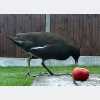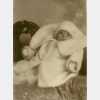| Profile | Posted by | Options | Post Date |

|
SylviaInCanada
|
Report
|
25 Apr 2014 04:52 |
|
from today's MailOnLine ........................
"The Cornish are to be recognised as a national minority group for the first time, it has been revealed.
Chief Secretary Danny Alexander announced the decision today, saying it meant for the first time that Cornish people would receive the same rights and protections as other minorities in Britain.
It will also mean they are classified under the European Framework Convention for the Protection of National Minorities the same as the UK's other Celtic people, the Scots, the Welsh and the Irish."
Read more: http://www.dailymail.co.uk/news/article-2611599/Cornish-recognised-national-minority-group-time.html#ixzz2zrnDxI2z
:-D :-D
|

|
Kense
|
Report
|
24 Apr 2014 19:42 |
|
Yes that's the right haplogroup Joonie.
Could be Jax.
|

|
jax
|
Report
|
24 Apr 2014 17:34 |
|
KenSE
We must be related then :-D
All mine are English but paternal line stems from Cornwall
|

|
JoonieCloonie
|
Report
|
24 Apr 2014 17:27 |
|
KenSE you must be Y haplogroup R1b1a2... like my Cornwall folk (U106) and the vast majority of the men in England :-D
my other family is I2b1, a whole nother kettle of fish ... one on which the project leaders and members at FTDNA are doing very interesting research, but not of the kind that finds me any family
I actually don't find the ethnic composition stuff that Ancestry gives very useful (or accurate) ... the nitty gritty is what I was after and have had such luck with but I know I am a rare bird in the world of DNA testing on that score, at least until a lot more people join the databases
|

|
JoonieCloonie
|
Report
|
24 Apr 2014 17:12 |
|
Eileen I have investigated my mum's father's side by having a male rellie of hers do the test so all hope may not be lost
the chain is broken by a daughter, so a son of my mum for instance would be useless :-)
but my mum had brothers who had sons, so there are male-line descendants of her father, my maternal grandfather, and their YDNA goes back through all the fathers' fathers
bottom line is it depends on what you want to find out (I can't tell from 'several different surnames')
if it's about a man who used different surnames for himself, yes, that is the situation I had on one side ... and a family history that suggests his registered father may not have been his biological father
I now know that he shares 'genetic' ancestors with a family with neither one of the surnames he used
this could be because the shared ancestor was before the time of surnames, which wasn't so very many generations ago, and the two branches simply adopted different surnames
it could be because his grandfather born in the late 1700s, or a male ancestor of that grandfather, was given his mother's surname, or wasn't the son of his mother's husband ... or it could be because the man himself born 1850 wasn't the son of his mother's husband ... so it hasn't answered all my questions by any means!
unfortunately the man born 1850 had three brothers (one younger who in particular may not have been a son of the husband) but none had surviving children ... so I can't test for his own 'legitimacy'
for YDNA (male-line DNA), the best way to visualise it is to look at your family tree
pick any male person on the tree - your great-grandfather, or your mum's nephew, or whoever - and just go back back back *only* through the male ancestors, and that is what YDNA testing could maybe tell you - whether it is an unbroken line ... but *only* if there is someone to compare it to
. a stranger who has tested with the same company (or submitted test results to that company as I did from FTDNA to Ancestry -- completely anonymously in both cases)
. another family member, if you suspect he has a different male ancestor
as for who could test, if you are sure your mum's brother's son has the same grandparents as you, for example, he could 'stand in' for your mum in the testing
check out jax's situation for an illustration
so it all depends on what the question is ! as to whether there is a way to use DNA to look for an answer
just a little explanation about why the male line can be traced with DNA but the female line can't
YDNA, what goes from father to son, 'mutates' regularly ... there will be on average a change every 4 generations or so ... a marker that has a value of '12' could mutate to '11' for instance
so if there are very few differences between the two sets of 'markers', likely the common ancestor is fairly recent
of the 67 markers I had tested, my rellie and my match's dad match perfectly on all but 4, and on those 4 they are only 1 'step' out (such as 10 vs 11) ... my rellie happens to have unusual marker values on 3 of those 4, so the mutations probably happened on my side and could be in quite recent generations (the markers in question are 'fast mutating' while some others normally don't change for many many generations) ... and we do match on 2 other markers where we both have unusual values, so those mutations probably happened before our shared ancestor
if you match with somebody on only 60 or fewer of 67 markers, you are related probably somewhere well before any records exist ... it would probably have taken that long for so many mutations to have happened
anyway, the DNA that women pass to their children (mitochondrial DNA) hardly ever mutates ... so we will have the same mitochondrial DNA as a gazillion other people and that wouldn't tell us anything about how we are related ... fortunately, there are not as often questions about a person's mother's identity :-)
so if you are looking for the 'real' surname of a male ancestor, YDNA testing could help (in different ways)
... IF someone with matching YDNA has tested
... or IF a close male relation turns out to have, or not have, matching YDNA
... or IF no one with the surname in question who has tested matches (as in my case, where not one of 700 tested people with the surname remotely matched) (but with a less common surname this would not be reliable)
(on that last point, in my other family, my rellie's YDNA is completely different from any other family with the same surname, but that doesn't mean that my clan in that little village didn't have the surname independently themselves, they just aren't related to the other clans around England with the same name)
I do have to stress how astoundingly lucky I was ! I was able to (probably) rule out one surname by the lack of matches, and found the other through the sheer luck of someone from the same place with the same YDNA having tested
|

|
Kense
|
Report
|
24 Apr 2014 17:02 |
|
Thank you JoonieCloonie for some useful positive thoughts on DNA testing.
My family tree is entirely English and Cornish so I was interested in seeing if I had any more esoteric ancestry in my male line, particularly as I can't get back to my paternal great grandfather's father.
From the result it seems that my ancestors could have been here since prehistoric times.
|

|
Eileen
|
Report
|
24 Apr 2014 11:34 |
|
The genes I was interested in was on my mothers side with several different names in it Are you saying that this would be a useless search? :-|
|

|
jax
|
Report
|
24 Apr 2014 04:10 |
|
I suppose it may be worth doing it for those reasons....I have found out that the last two remaining daughters of this man have recently died...maybe she didn't want them to know? as nothing was mentioned on her tree until I told her about it...then it was' jax has said this is his baptism could be true' of course it was the address on the baptism is the same as the parents marriage....he was never known by his birth name though on any census, Army records or marriage ect
My dads cousin went on to have 7 sons so at least the name continues...otherwise it would have more or less died out by now
|

|
JoonieCloonie
|
Report
|
24 Apr 2014 03:09 |
|
yes indeed jax, comparing your dad's DNA and his cousin's son's DNA would do the trick
let me just get the generations straight
Mr X is your dad's father
Mr Y is your dad's father's brother, your dad's uncle
... except you know he wasn't the son of the same man as Mr X
Mr Z is your dad's grandfather
Mr Z is supposedly the great-grandfather of your dad's cousin's son
... but you know he wasn't
so yes, your dad is but 2 generations from Mr Z
and your dad's cousin's son is 3 generations from him
in that space, there could have been a mutation on either side or both sides, but it would be so minor that the YDNA of your father and his cousin's son would be identical for all intents and purposes ... if his cousin's son was really descended from Mr Z
if your dad's cousin's son is not descended from Mr Z, then his YDNA will be wildly different from your dad's ... unless he descends from Mr Z's brother ;-)
(note that this depends on it being a straight male line - your dad's cousin whose son this is was a boy cousin)
the granddaughter in question may not want to know, but others in her family may want to, some day, so it makes sense to test now rather than wait until another generation is gone ... possibly leaving no male descendants
one would hate to think that a mere 400 names in a tree would make someone not want to know the truth ! although it is certainly understandable that someone might be leery of it for other reasons ... one's name and ancestors being part of one's identity, especially for people who take such an interest in their genealogy
it's always easier to be curious about more remote ancestors' goings-on, back beyond the ones we actually knew ourselves !
of course, when it comes to my paternal grandfather, as my mum said a while back, she wouldn't have put anything past him ... :-)
oh and by the way, the cheapest available YDNA test will suffice for this purpose - FTDNA no longer sells 12 markers because it isn't good for anything else, but if you could get 25 markers (rather than 37) that would absolutely do it
|

|
jax
|
Report
|
24 Apr 2014 02:41 |
|
Joonie
My paternal grandfather had three brothers, only him and his eldest brother had sons (the other two didn't have any children)
I found out that this older brother was illegitimate but his granddaughter does not want to accept this from what I can see from her tree. He was born a year before the gt grandparents married, then baptised three months later in mothers maiden name with a fictitious father.
The only male relative I have is my dad and all his male cousins are now dead, so if he and one of his cousins sons had their DNA tested would it prove they are not both descended from this man?
Mind you, I doubt whether she would want to know, otherwise she would have to remove 400 years worth of names from her tree :-D
|

|
JoonieCloonie
|
Report
|
24 Apr 2014 01:19 |
|
there are so many misconceptions about DNA for family history purposes ...
First off, do not use Ancestry. Use any company but Ancestry.
Ancestry provides no support or framework for your research.
Family Tree DNA for example (which I use) has many projects based on surnames, geography, haplogroup, etc and many volunteers who run the projects, pursue research and help new users.
it's true that getting a DNA analysis done is very unlikely to find you a whole new branch of your family tree, or the missing link in your trail back beyond where you are stuck ...
that's because such a tiny percentage of the earth's population ... or even of the population of the western countries where people are more likely to do this ... has had their DNA analysed for this purpose ---- you can't find a match with somebody who hasn't tested !
but it is also true that sometimes it happens ... it did for me
not for me personally since women do not have the right DNA for tracing an ancestral line directly ... it takes the male DNA for that, the stuff that goes father to son with very few changes along the way
it all depends on what you are looking for ... and in my case, on one side of my family, I was looking to find out who the heck they were, since there were twisty turns and tall tales that had left me stymied at about 1800, and not even at all sure before about 1850
I wondered whether the male-line DNA might provide a firm answer to the 'real' family surname (which, of course, follows the male line) and thus to the ancestry in that line (hoping to pick up some wives/mothers along the way if I could find the men in the line)
I had the DNA of two male rellies analysed, one on each parent's side
and yes, lo and behold, I got my answer ... not the one I was expecting, a whole strange new surname, but virtually undeniably the right one for my family
now, that being the case depends on the surname being the right one for the other person's family ! but here that does seem to be true, there is a good paper trail going back to the mid-1500s and possibly beyond
my rellie's DNA was a very close match with the DNA of someone whose grandfather emigrated to the US around 1850 from within a few miles of where my people were in Cornwall around 1850, a close match enough that that there is a better than 3 in 4 chance of a shared ancestor 12 generations back from the two people who tested (roughly sometime around 1500), and thisclose to a 100% chance of a common male ancestor twice that far back ... for various reasons, including the demographics of Cornwall, I think the connection is probably someone born after 1500
what this has done is prove that this male line is not the surname I had thought it was, since of the 100s of people with that surname who have tested there is not one match, even weak
I have not yet been able to do anything with this info, but I find it fascinating :-)
on my other side, it's lucky I wasn't looking to find out anything in particular, because I haven't ... except that I'm probably wrong about my ancestors also being the ancestors of a large clan in the USA descended from a pair of very early settlers there who had the same surname and had seemed to come from the same area, darn ... the probable reason being that my ancestor born abt 1820 was the only child of an only child of an only child (from parish records) and there just is no one else left of that particular clan that had lived in that particular village as far back as parish records go
oh, but I did upload those results to Ancestry (free to do if you test somewhere else) and find a 100% perfect match with someone ... a fellow greatx2 grandchild of the ancestor born 1820, the only child who went forth and multiplied - someone who was born in the USA after his grandfather emigrated and whom I had already 'met' on line after he saw my census notes at Ancestry about our mutual family ... no news there, except to confirm that at least from that mutual ancestor forward, our lines are both 'legitimate' :-) ... but since I would not be surprised if my grandfather in particular had other non 'legitimate' descendants out there, maybe one day we will help them find their ancestry
so YDNA is the thing most likely to prove useful for genealogical purposes ... ladies, you just have to get your male rellies to open wide so you can get their cheek scrapings
'autosomal' tests (what FTDNA calls 'family finder' tests) for both sexes can find cousins up to the 5th cousin relationship, and so can also help to determine or confirm genealogical facts ... I'm not well versed in that one
I don't like to see this endeavour pooh-poohed simply because it would serve no purpose for one person ... it could be very useful for some people, especially those who have unknown fathers in their trees ... and at the very least it is fun for some of us
and as far as the 'giving your DNA away' aspect ... well granted I would never give mine to Ancestry ... but the bits that are used for this purpose have nothing to do with medical or other personal characteristics ... so the results of the testing done do not tell anyone anything sensitive or identifying about you or your family ... and you can shield your identity so that even your name is only disclosed to matches if you decide to do that
and yes, the company you use does hold your genetic material, but it is yours and you can require it to be returned or destroyed at any time
it's important to know what your goals are and learn a bit in advance so you can tell how likely this approach is to achieve them
I was just amazingly lucky that one person of the few people in the world who might hold the genetic key to my family's ancestry had tested when I did, and now I'm a bit hooked on the whole thing ... so ... the more the merrier !
:-D
sorry about the long post, I just think it can help people who are wondering about this to know what could be possible from it and know what to expect (and not expect) if they go ahead
now ... mobile phones ... never had one and wouldn't know how to use one! the reason being that I don't need one, while some people plainly do ... I did use a university's computer for my research job in 1973 though ... punch cards and all ...
|

|
SylviaInCanada
|
Report
|
23 Apr 2014 00:55 |
|
I would have loved to have a cell phone when we were driving 700 km to oru cabin ......... for safety reasons, both on the road and at the cabin
BUT
the practicalities of living in a country as large as Canada is that there is just not the service that you all expect to have.
A cell phone is fantastic when in any community of more than a couple of hundred people ............ and I would not hesitate to have one if I was round and about the city I live in, as I was 20 years ago.
But "on the road" is a very different matter
Of the 700 km journey to the cabin, perhaps about 200 km would be covered by cell company coverage ........................ and there was no coverage at all in the most dangerous driving area.
Nor is there any coverage at the cabin.
Cell phone providers demand a certain number of users to make their profit. Installing cell towers on the top of a mountain at the back of nowhere, with about 100 people possibly living within 100km is not money producing!
The other possibilities are a satellite phone for thousand of dollars to buy and in the hundreds for use, or a radio phone.
|

|
Eileen
|
Report
|
22 Apr 2014 14:14 |
|
RSTAR. We could well be. I have several Royals in my tree and have even gone as far back as the Vikings. We shall have to find out where we both belong sometime. Naturally, there must be many people who can follow this tree especially as there are a lot of Ferrers still living in Leicestershire, but it has been very interesting finding these people.
QWe were told as children that they belonged to my fathers side, but it was on my mothers that I did find them. I have lots of Thomas Greens, my fathers side, but can't actually manage to go very far with it.
I too have Staffords.
|

|
ErikaH
|
Report
|
22 Apr 2014 14:11 |
|
Just because some people seem to have their mobiles welded to their ears does not seem a compelling reason for not having one. But..........each to his own
It is up to each individual to use his/her mobile in whatever way suits them best.
I have had one ( pay as you go) for close on 20 years, but I never have it switched on unless I am using it, which is rarely.
But it is useful to have in case of emergencies - especially when travelling
|

|
DazedConfused
|
Report
|
22 Apr 2014 13:40 |
|
I have a mobile phone which is rarely switched on, but with me all the time.
When I worked I was out and about in all areas of London often before daylight. And after a long discussiom with colleagues and OH, I decided that for my own safefty that a mobile phone would be a very good idea.
I was in my own car visiting many different parts of Sth and SW London, and if at any time my car or I was in any trouble I would not need to wander around any dubious areas trying to find a call box that worked.
I think all women should carry one, and it does not need to be a top of the range one.
OH has a £10.00 basic model and has had if for years now. As said it cost £10.00 and had £5.00 on it to start, so it really only cost £5.00. Like me he carries it round all the time, but rarely uses it.
|

|
RStar
|
Report
|
22 Apr 2014 12:19 |
|
PS Eileen, my mums side has Catherine, Elizabeth, and Richard Woodville. All born 1400s; so we probably have a connection. Catherine married into the Stafford's; her son was the grandfather of Lady Catherine Neville.
|

|
RStar
|
Report
|
22 Apr 2014 12:11 |
|
Eileen, Im glad you asked because Ive been curious about this for quite a few years.
|

|
Eileen
|
Report
|
22 Apr 2014 11:39 |
|
I didn't post this request to start a war, I just needed info and have now decided not to have dna done.
We never had a phone at our house when I was a child and thought people rich who did, but looking back, you could always get to a phone booth quickly which my husband had to do when I was in labour.
Life is too short to argue so please be kind to each other. :-)
|

|
patchem
|
Report
|
22 Apr 2014 07:23 |
|
i do not agree with Slartibartfast's comment, nor with this one from KenSE
'I don't think it is luddism so much as the fear that decades of painstaking research and hundreds of pounds of certificates, would be rendered useless by a DNA test.'
The years of painstaking research show who lived in which household with which people, not who were the biological parents.
That is of more importance to many researchers.
To be slightly controversial this is probably a more female focussed way of looking at history. Men tend to be the tree collectors who want the factual parentage.
The trees and research introduce many people to history who had no interest in it at school.
I decided that one of my ancestors had turned to prostitution, so know that the tree works for her first children, but not for the later ones.
So what?
It gives an insight into life at that time in history.
They give great enjoyment to thousands of people.
I do not see any fear of that research being made useless.
And DNA testing for family history research is a complete waste of money for most people at the moment.
In addition, we had no telephone in our house until the mid/late 1950's.
However, I was introduced to computers at about the same time, as my cousin made them from army surplus parts. They would be regarded nowadays as calculators. They had flashing lights and worked in binary. We used to have competitions converting from decimal to binary (and now to hexadecimal). Computers with punch cards were part of my university course in the 1960's.
|

|
SylviaInCanada
|
Report
|
22 Apr 2014 04:16 |
|
Well now,
perhaps I am a luddite :-D
I was born and lived the first 11 years of my life in a 2 up 2 down terrace house that did not have indoor plumbing :-)
That house was still standing in 2008, so I sincerely hope it now has been modernised
We did not have a phone in the house until I was about 18 ........... although grandfather had had one from about 1920.
Just think of the peace of no-one being able to contact you at all hours of the day or night. Bliss, utter bliss :-)
We refuse to have a cell phone of any sort ................... I hate seeing people on their phones in the street, on the bus, in coffee shops, restaurants, etc etc, and have no desire to join them
But I have been involved with computers since 1963 .......... using one initially to get results for my genetics degree :-)
|

